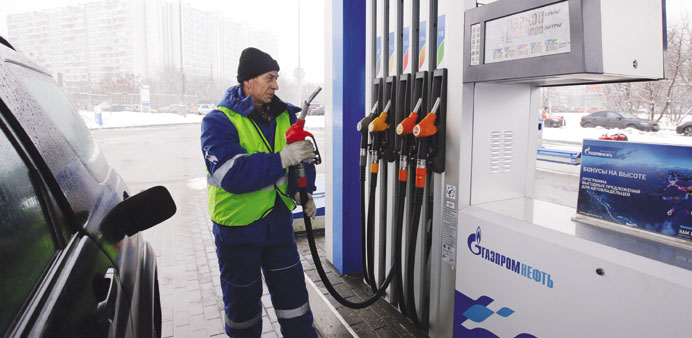An attendant returns a fuel pump after filling a vehicle at a gas station operated by OAO Gazprom in Moscow. Europe’s natural gas prices would have to double to lure enough cargoes from the global market to replace Russian supplies.
Bloomberg/Moscow
Europe’s natural gas prices would have to double to lure enough cargoes from the global market to replace Russian supplies, adding to the challenges of decreasing the region’s dependence on its neighbour.
Benchmark UK prices would need to rise 128% to attract liquefied natural gas if Europe had to replace all its Russian fuel for two summer months, according to Energy Aspects in London. LNG, shipped by tanker from as far away as Australia, would be the main alternative to the regional pipelines filled by Russia.
The European Union will announce a strategy by June for reducing its reliance on Russia, whose annexation of Crimea this month sparked the biggest regional crisis since the Cold War. The 28-nation bloc gets a third of its gas from Russia, mostly via Ukraine, at an annual cost of about $53bn. The EU would need to pay as much as 50% more to replace that with a combination of LNG, Norwegian gas and coal, according to Bruegel, a research group in Brussels.
“There will be high costs for a complete switch,” said Will Pearson, director for global energy and natural resources at Eurasia Group in London. “Russia will continue to be an important supplier to Europe, but I do think the emphasis will be on diversifying capabilities anyway so that they can import other sources when needed.”
Europe imported the least LNG in nine years in 2013 as demand weakened, according to BG Group. A drive to buy more cargoes in the spot market would pit the region against Asia, where prices were on average about 30% higher last year. Japan accelerated imports of the chilled fuel after closing its nuclear power plants following the Fukushima disaster in 2011.
A halt to Russian gas supply this summer would double UK prices to more than $18 per million British thermal units, said Mike Fulwood, a London-based principal for global gas at Nexant, which advises utilities and governments. Increased competition for LNG supply would also mean about a 19% increase in costs for Asia, he said. European terminals can import as much as 199bn cubic meters (7tn cubic feet) of gas a year, according to Gas Infrastructure Europe, a lobby group in Brussels. Russia supplied 138bn cubic meters to the EU last year at an average price of $387 per thousand cubic meters ($10.50 per million British thermal units), according to OAO Gazprom, the Moscow-based Russian pipeline gas export monopoly.
“It’s probably not impossible to eliminate Europe’s dependence on Russia for gas, but it’s not going to be a cheap or easy project,” Laszlo Varro, the head of the International Energy Agency’s gas, coal and power markets division, told a conference in Berlin on March 25. “It would take some very difficult and very expensive policies.”
Dependence on Russian gas ranges from 100% in Finland to 37% in Germany and 16% in France. Belgium and Spain are among those who get no Russian fuel. Some nations are already trying to diversify their supply. Poland, with a 59% dependency, says it will complete an LNG terminal by May 2015. Neighbouring Lithuania, which gets all its gas from Gazprom, will receive a floating LNG facility by the end of 2014. France will start an LNG terminal next year, while a cancelled project in Germany may now find new investors. Croatia and Ukraine are also reviewing projects.
The 18-member euro area’s economy will expand 1.1% in 2014, after contracting for two consecutive years, according to the median of 53 economist estimates compiled by Bloomberg. Surging energy costs would threaten the recovery. A halt in supplies would hurt Russia more than the EU, said Georg Zachmann, a research fellow at Bruegel in Berlin.
Europe is Gazprom’s biggest market by sales and the region pays more than Russian customers or some other buyers in the former Soviet Union, according to the state-backed company’s latest financial report. Lost revenue from the EU would also deplete the state budget, 15% of which comes from gas sales, Zachmann said. Sergei Kupriyanov, a spokesman for Gazprom in Moscow, declined to comment.
Gas is flowing from Russia to the EU as normal and the bloc expects Russia to meet its supply commitments, Sabine Berger, an energy spokeswoman for the European Commission, said on March 26. Exports to Europe expanded 2.9% this year through March 26, Russian Energy Ministry data show. US President Barack Obama said on March 26 in Brussels after meeting European leaders that the EU should consider gas imports from the US as well as developing domestic resources, according to the Paris-based International Energy Agency.

